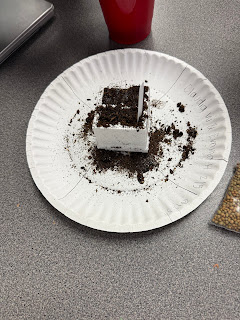Week 3 Lab 02/05/2025
This week in lab I learned and got clarification more so on how similar the life cycle is for different insects: beetles, mealworms, and butterflies. I think that as a learner I tend to overthink life science processes, but today I was able to simplify those and feel much more confident of all that I have learned in the past. Also, when we focused on the different parts of the mealworm I did not know how complex and how many parts each bug consists of! It was much more complicated than I thought, but it makes sense!
After our lentil seed beginning last week our group's did not grow very much, and we planted another plant today. I think that by my past knowledge my group mates and I were able to determine that a couple factors that could have affected our slow growing plant could be seed quality, amount of seeds planted, and the amount of water given to the plant. With out prior knowledge we were able to figure this out, and added more water to it in hopes that next week we will have more sprouts!
For my future classroom, I want to incorporate activities like germination of seeds and hands on activities like our play doh life cycle so students stay engaged and actually get to DO science rather than just be lectured on it. I think that making things and participation help with learning a lot, and so both activities that we did this week in lab are great examples of hands on activities that I want to use in my classroom one day.





Hello Madison!
ReplyDeleteI really enjoyed reading your post! I also thought it was very interesting to learn more in-depth about the characteristics of mealworms. I also want to make hands-on activities a big part of my science instruction as a future teacher. Learning by doing is a lot more beneficial in my mind than lecturing, as you stated in your post. I loved when we got to grow plants in science growing up, so that is definitely something I would like to incorporate as well. I liked the point you made about group members talking about why they didn't get the results they anticipated. That is a huge part of science that sometimes can go unnoticed. Great post!
Hi Madison! In my future classroom I also want to incorporate hands on activities because I believe it is more engaging than a lecture too! It also allows students to learn from each other and problem solve. After reading how your group had to replant this shows the benefits of doing hands on activities. It shows teamwork, critical thinking, and problem solving. This week during class I also got more clarification of the life cycles and I also tend to over think science too. I really enjoyed reading your blog this week and I like how you added all three pictures.
ReplyDeleteHey Madison! Great blog post. I agree that having students actually engaged in science instead of being lectured on it makes science education better. We learn more by doing! I also liked your plant life cycle, very detailed. By making our teaching student-centered we can make science more interesting. I like how you said you sometimes feel overwhelmed about learning science. I think this is the case for lots of students and can help you connect more with them in your own classroom one day. I also think this feeling is another reason why an inquiry-based approach is so important, by doing this we break science down. Have a great weekend!
ReplyDelete